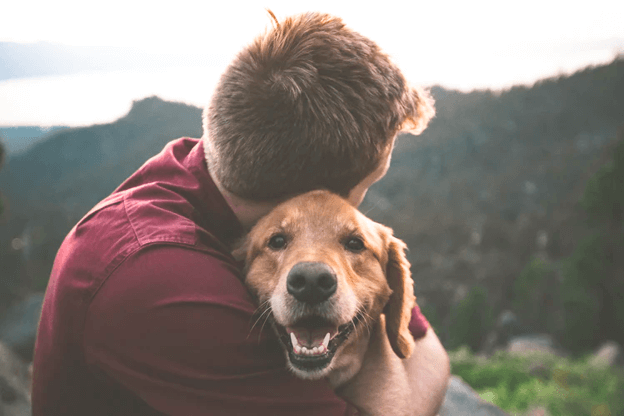Proof That Younger Isn't Always Better When You're Going Down The Adoption Route
Thanks to ongoing ‘adopt don't shop' campaigns and a worldwide pandemic that's ensured more of us than ever meet adoption criteria, it's fair to say that animal rescues are experiencing something of a boom. In fact, with animal adoption rates soaring from 58% at the beginning of March last year to 85% by the end, it's no wonder that many shelters are reporting shortages. We just can't get enough of preloved pooches right now and, for animal lovers everywhere, this shift to rehoming couldn't come soon enough!
Unfortunately, while positive influences have definitely taken more of us than ever down the adoption route recently, there is still one area that needs much improvement, and that's our adoption efforts for senior animals, specifically older dogs.
Unsurprisingly, near enough every family dreams of a puppy that can grow right along with them. But, when you look at the kennels that remain frustratingly full right now, they're typically occupied by dogs that are 5 years+.
In reality, however, there's no need for this trend. Even a ten-year-old dog has a huge deal of potential for life left in them, especially if taken out of that terrible kennel situation and put instead into a loving family environment. What's more, most adoption centers also offer veterinary advice to ensure these longer lifespans, whether that's in the form of recommendations for dietary changes, suggestions of dog braces for legs that provide a new lease of life, or even ongoing treatment plans for existing conditions. With these tools, even an older dog who seems incapable of hobbling around his kennel could be running across your garden back home in no time. But, he needs you to give him the chance to do so in the first place!
Before you jump into those puppy-filled kennels, then, it's worth sparing a thought for the center's more long-standing residents. You might even find that this ends up being the best thing for your family. After all, young dogs aren't for everyone, and we're going to look at some of the reasons why.
Younger dogs are more in demand
The vast majority of people looking to adopt look for dogs that are under the five-year mark, with the vast majority of puppies reserved well in advance of their arrival at any shelter. We really can't get enough of the youngsters but, if you're looking for a companion that you can enjoy right now, this may not be the best way to go about it.
After all, putting your name on a waiting list for puppies means you might be waiting for an undetermined amount of time before you can bring your new arrival home. Even then, you'll have no way of telling what dog you'll get until you receive that phone call, and if you aren't happy to proceed, then you'll be right back at the end of the queue.
Even slightly older dogs (typically the under-fives,) tend to be snapped up sharpish, meaning that finding the ideal match could take as long as a year or two. By comparison, nearly every adoption centre in the country is dealing with an influx of older dogs crying out for homes right now. Forget waiting lists or fighting it out for a dog that might not even be what you're after, taking this route could see you having your pick of some amazingly gorgeous pooches, and enjoying fast-tracked adoption benefits as a result.
Admittedly, even adopting older dogs requires home visits, lifestyle checks, and relationship building in advance, so this still isn't an immediate fix. That said, you could be taking your older dog home in a matter of weeks, rather than a matter of months or years.
Younger dogs require much more commitment
Younger dogs might be cute but, as you'll know if you've ever had a puppy (or even a dog under the age of around two,) they're also a whole lot of work to deal with. Like a toddler who's just learnt to crawl, puppies can get into everything, causing a whole load of mischief unless you keep an eye on them 100% of the time. We're talking chewed wires, ruined couch cushions (or couches,) and, of course, the dreaded indoor toilet accidents.
Slightly older dogs can be even worse, with pooches around the one year mark typically acting like rambunctious teenagers who run everywhere, knock everything over, and generally leave a trail of destruction miles long behind them.
In short; even our new home working setups don't necessarily prepare us for the work that a younger dog can bring into our home lives, and it can come as something of a shock. For families with younger kids, especially, the pure energy that a younger dog brings can spell trouble.
By comparison, older dogs of all shapes and sizes can feel like a walk in the park. Senior dogs, in particular, will likely be happy to sleep by your feet all day as you get on with work if that's what's on the table. Even just a dog that's a few years older will likely be much calmer, and in most instances, fully house trained. Obviously, health considerations can increase daily care rituals, but strapping a leg brace to your senior pooch isn't exactly a chore akin to cleaning the fifth accident of the day from your cream carpets!
Younger dogs can be unexpectedly difficult
While it's not fair to say that every adopted dog has difficulties, many of the young ones sadly do. In some instances, bad behaviour is the reason that younger dogs end up in homes in the first place. For puppies who find themselves here through abuse or neglect, those experiences can creep in to create hostile behaviour or bad household habits. It can also take a while for a dog's personality to shine through, meaning that you may see some undesirable behaviors creeping in down the line when you aren't looking.
Admittedly, bad behaviors are often a sign of this difficult start in life that, with love and commitment, you should be able to nip in the bud, but if you have young kids or limited time on your hands, these are setbacks you definitely won't want to deal with.
By comparison, older dogs are much more of a ‘what you see is what you get' commitment, with the behaviors that you witness upfront typically being the temperament that you can expect to stick. Of course, this can work both ways, with dogs that display aggressive behavior when in the kennel typically difficult to train. But, if you make sure to pay your potential older pooch plenty of visits beforehand, you'll be in the best possible position to know whether they have a personality that you can get behind. After you've put in this legwork, it's unlikely that you'll experience any nasty surprises later on, leading to a happy and lasting relationship with the pooch of your dreams.
Younger dogs aren't always as grateful for your efforts
No one adopts for the thanks, but it's always nice to feel appreciated as a dog owner, especially when you've gone through the adoption process, what with the paperwork and the inspections. Unfortunately, due both to their rambunctious natures and the fact they've likely been in a kennel for a shorter period, young dogs typically don't acknowledge your efforts at all. In fact, far from it, they may play you up, display aggression to you (as mentioned,) or altogether trash your home. None of which is what you imagined when you went to all that effort in the first place.
By comparison, slower, older dogs who tend to have spent longer in kennels themselves are typically much more appreciative to have you around at last. While they might not exactly be able to thank you in words (come on, be fair!) they are more liable to spend time with you whenever they can, seek snuggles at every possible opportunity, and generally thrive to show you that your efforts have been very well received. This can lead to owner-dog relationships like no other and are guaranteed to pave the way towards the loving friendship you always hoped for when you considered adoption in the first place.
A final word
Adopting a dog is an amazing thing to do, regardless of age, background, or anything else. No pooch deserves to be behind bars, and the more that we can keep spreading the ‘adopt don't shop' message, the better chance we have of putting it on the map.
That said, if you are considering adopting a younger dog right now, we would urge you to ask whether an older dog instead deserves a place in your home. It might not be what you had always imagined, but a senior dog, or even just a dog slightly past their prime, could bring love like you'd never imagine. Not to mention that this shift in focus could see you rescuing a dog that, without your love, risks spending the rest of its life behind bars.
839GYLCCC1992





Leave a Reply